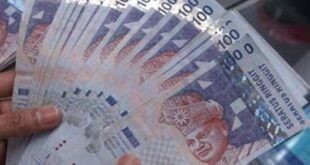First phase of masterplan includes upgrading roads and constructing new connections
WITH the aim of reducing traffic woes by 30%, Shah Alam City Council (MBSA) has unveiled a comprehensive traffic masterplan.
The plan outlines a three-phase approach to address the city’s growing traffic congestion and create a more efficient and systematic transportation network.
Shah Alam deputy mayor Cheremi Tarman said about RM25mil was required to carry out Phase 1 of the traffic masterplan.
The first phase set to begin in 2025, he said, focused on short-term solutions that did not require land acquisition or complex processes.
This includes addressing missing links like completing unfinished road connections such as the one connecting Bukit Jelutong with Bukit Cherakah.
Then there’s upgrading key roads to improve traffic flow on major arteries like Persiaran Kewajipan.
Cheremi added that the phase also included building a 22.3km middle-ring road to alleviate pressure on existing routes.
A total of 81 road junctions will also be upgraded thus optimising traffic flow at key intersections.
MBSA was the first local government in Selangor to embark on such a masterplan aimed at providing an efficient and systematic traffic management system, he added.
“The first phase comprises the short-term traffic plan that will start in 2025 while the second phase takes place in 2030 and the third in 2035,” he said during a town hall session of the traffic masterplan presentation at a hotel in Klang.
MBSA, he said, had studied the traffic masterplan for a year.
Cheremi added that Phase 1 could be carried out without any acquisition of land.
He stressed the urgency of securing funding for the crucial phase, adding that MBSA was exploring options such as seeking assistance from the federal and state governments and utilising the city council’s reserve fund, subject to state approval.
Cheremi said the traffic management plan comprised the wider use of existing facilities, increasing safety of road users, protecting the environment by reducing carbon dioxide emissions and implementing interchangeable road designs that were cost effective and had long-term benefits.
MBSA Engineering Department acting director Hanif Basree Abdul Rahman, who highlighted the severity of the traffic situation at the town hall session, said based on morning and evening rush hour surveys at 98 locations, over half exhibited critical traffic conditions.
He said 13 locations indicating severe congestion and 52 signified critical situation with excessive delays and travel times.
Hanif Basree said according to data, approximately 79,441 and 79,106 vehicles entered the city during morning and evening rush hours respectively, and 80,848 and 87,326 vehicles exited Shah Alam during those times.
The event was attended by representatives from the Public Works Department, Mass Rapid Transit Corp Sdn Bhd (MRT Corp), police, Petaling and Klang land offices, Prolintas, and other local councils in Selangor.
 BeritaKini.biz Berita Viral Terkini di Malaysia
BeritaKini.biz Berita Viral Terkini di Malaysia





